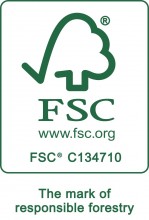
What is FSC® Chain of Custody?
Chain of Custody certification is for companies who process, manufacture or trade in timber derived products. By implementing and maintaining a robust chain of custody system, companies can provide assurances to suppliers & clients that their products are sourced and produced in compliance with an ecological, social and economic standard.
FSC is an international organisation that brings people together to find solutions which promote responsible stewardship of the world's forests:
- FSC is a stakeholder owned system for promoting responsible management of the world's forests.
- Through consultative processes, it sets international standards for responsible forest management.
- It accredits independent third party organisations who can certify forest managers and forest product producers to FSC standards.
- Its trademark provides international recognition to organisations who support the growth of responsible forest management.
- Its product label allows consumers worldwide to recognise products that support the growth of responsible forest management worldwide.
- FSC undertakes marketing programs and information services that contribute to the mission of promoting responsible forestry worldwide.
- Over the past 12 years, over 84 million hectares in more than 82 countries have been certified according to FSC standards while several thousand products are produced using FSC certified wood and carrying the FSC trademark. FSC operates through its network of National Initiatives in 40 countries.
What are the benefits?
Chain of custody certification demonstrates to your customers your commitment to responsible supply chain management, it also provides:
- Added value to your products
- Access to new markets
- Compliance with legislation
- Proof of traceability
- Use of the FSC trademark
- Assurance to your customers that they are contributing to environmental conservation and economic stability
